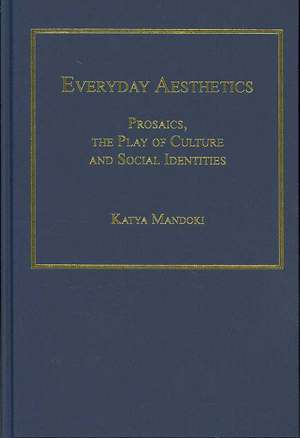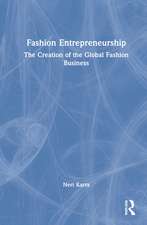Everyday Aesthetics: Prosaics, the Play of Culture and Social Identities
Autor Katya Mandokien Limba Engleză Hardback – 28 iun 2007
| Toate formatele și edițiile | Preț | Express |
|---|---|---|
| Paperback (1) | 489.26 lei 6-8 săpt. | |
| Taylor & Francis – 6 mar 2017 | 489.26 lei 6-8 săpt. | |
| Hardback (1) | 1116.27 lei 6-8 săpt. | |
| Taylor & Francis – 28 iun 2007 | 1116.27 lei 6-8 săpt. |
Preț: 1116.27 lei
Preț vechi: 1361.30 lei
-18% Nou
Puncte Express: 1674
Preț estimativ în valută:
213.59€ • 223.01$ • 176.78£
213.59€ • 223.01$ • 176.78£
Carte tipărită la comandă
Livrare economică 04-18 aprilie
Preluare comenzi: 021 569.72.76
Specificații
ISBN-13: 9780754658894
ISBN-10: 0754658899
Pagini: 344
Ilustrații: Illustrations
Dimensiuni: 156 x 234 x 21 mm
Greutate: 0.66 kg
Ediția:New ed
Editura: Taylor & Francis
Colecția Routledge
Locul publicării:Oxford, United Kingdom
ISBN-10: 0754658899
Pagini: 344
Ilustrații: Illustrations
Dimensiuni: 156 x 234 x 21 mm
Greutate: 0.66 kg
Ediția:New ed
Editura: Taylor & Francis
Colecția Routledge
Locul publicării:Oxford, United Kingdom
Notă biografică
Katya Mandoki is Professor of Aesthetics, Semiotics and Design at Universidad Autónoma Metropolitana, Mexico.
Cuprins
Part 1 The Labyrinths of Aesthetics; Chapter 1 The Problems of Aesthetics; Chapter 2 The Fetishes of Aesthetics; Chapter 3 The Myths of Aesthetics; Chapter 4 The Fears of Aesthetics; Part 2 On Aesthesis; Chapter 5 Demarcating Aesthetics; Chapter 6 Basic Categories for Aesthetic Analysis; Chapter 7 Conditions of Possibility of Aesthesis: The A Priori; Chapter 8 The Phenomenology of Aesthesis: Aesthetic Latching-On and Latched-By; Part 3 Towards Prosaics; Chapter 9 Prosaics and Poetics; Chapter 10 The Tangents of Prosaics; Chapter 11 The Nutrients of Prosaics; Chapter 12 The Play of Culture; Chapter 13 The Horizons of Prosaics; Part 4 Semio-Aesthetics; Chapter 14 Thresholds of Semiotic Perception: Sensation, Discernment and Regard; Chapter 15 The Axis of the Signic; Chapter 16 The Axis of the Symbolic; Chapter 17 Comparative View of Both Axes: The Symbolic and the Signic; Chapter 18 The Non-Axis of the Obtuse; Chapter 19 Beyond Semiosis to Aesthesis; Chapter 20 Aesthetic Enunciation and its Dialogical Character; Part 5 Octadic Model for Aesthetic Analysis; Chapter 21 Rhetoric and its Registers; Chapter 22 Dramatics and its Modalities; Chapter 23 The Rhetoric-Dramatic Coupling; Chapter 24 Con-Formations of the Rhetoric-Dramatic Coupling; Part 6 Matrixes and Identities; Chapter 25 The Matrixes: A General Approach; Chapter 26 Diachronic and Synchronic Perspective of Cultural Matrixes; Chapter 27 The Family Matrix; Chapter 28 The Religion Matrix; Chapter 29 The School Matrix; Chapter 30 The Medical Matrix; Chapter 31 The Occultist Matrix; Chapter 32 The Arts Matrix; conclusion Conclusions Matricial Symbols and Aesthetic Games;
Descriere
Starting from Dewey's pragmatism and biologically inspired philosophy, Mandoki updates key debates in aesthetics to project them into the realm of a socio-aesthetic inquiry. She argues that in every process of communication, whether face to face interactions or through the media, fashion, marketing, or political propaganda, there is always an excess beyond the informative and functional value of a message: this excess is the aesthetic. Teachers and students interested in qualitative analyses in humanities and social sciences will find an original, precise and insightful proposal in this book.














